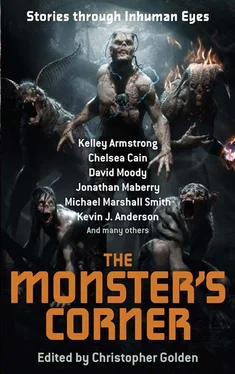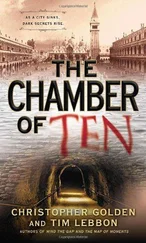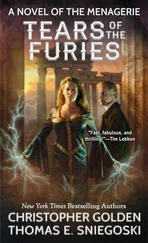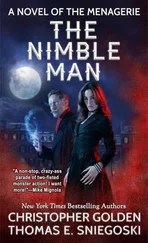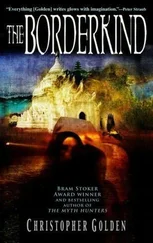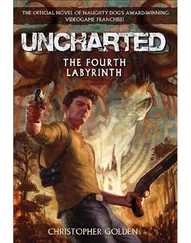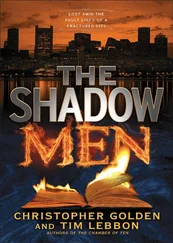With his first armload hugged to his chest, he stood on the top step. The faces of the saints regarded him, and shadows cast by flickering flames played across their mouths so that it seemed as if they spoke, whispering secrets. Some of them Saint John understood; some were still mysteries to him.
He did not see the faces of the angels. The open doorway was a dark mouth, but it was filled with empty shadows, and so he entered with his armload of weapons. He paused in the narthex and looked down the long aisle that ran from the west doorway behind him all the way to the altar at the eastern wall.
The cathedral was vast, with vaulted ceilings that rose high into the darkness. The arches were revealed only by stray slices of firelight through the broken stained glass windows, and in this light the lines of stone looked like bones. Saint John walked to the center aisle and stopped by the last row of pews, bowed reverently, and then walked without haste through the vast nave toward the altar table.
“I bring gifts,” he said. His voice was soft, but the acoustics of the cathedral peeled that cover away to reveal the power within, sending the three words booming to the ceiling.
As he walked to the altar the weapons clanked musically, like the tinkle of Christmas bells. He stopped at the edge of the broad carved silver altar table and laid his offering in the center. Then, taking great care, he arranged the blades and hammers and brass knuckles in a wide arc, the blades pointed toward the rear wall, pointing to the base of the giant crucifix that hung on the eastern wall. Jesus, bleeding and triumphant, hung from nails. Saint John knew the secret story of this man. Jesus had not died to wash away the sins of monsters like Saint John’s father. No, he had allowed his body to be scourged and pierced as part of the ritual of purification, then he had ascended through the pain into godhood. Saint John marveled that so many people over so many years had missed the whole point of that story.
Once the knives were arranged — seventeen in this armload — and the rest of the weapons, Saint John bowed and headed outside for more.
It was on his second trip into the church that he noticed the footprints on the sidewalk. Small feet. A woman. Rose? Surely hers, but there were other prints; much smaller and many of them. They were pressed into the thin film of fine ash that had begun to settle over everything. Delicate steps.
Angel feet?
Saint John stood for a moment, his arms filled with bloodstained weapons, contemplating the footprints. Then he went inside.
However, he paused once more as he approached the altar table.
On his previous trip he had placed seventeen knives on this very table, arranged by size and type, from a machete to hunting knives and steak knives to a lovely little skinning knife with which he had whiled away an evening last week. There were not seventeen knives now.
Now there were two. Only the long machete and an unwieldy Gurkha knife remained. The brass knuckles and clubs and guns were still there. Fifteen knives, though, were gone.
Saint John considered this as he laid his second armload down on the altar. He did not for a moment believe that he had only imagined bringing in those knives. Many material things in his perception were of dubious reality, but never blades. They were anchors in his world, not fantasies. The flying saucers he sometimes saw … those, he knew, were fantasies. Knives? Impossible.
Nor did he believe that someone — perhaps the little junkie — had snuck in here and stolen the knives.
He was considering possibilities and probabilities when he heard a soft sound. Barely a sound at all. More of a suggestion, like the sound shadows make when they fall to the ground as the moon dances across the sky. Soft like that.
He cocked his head to listen. The cathedral was empty and still.
Were demons moving silently between the pews? Had demons come to take his knives?
Saint John was suddenly very afraid.
Could demons materialize enough to be able to like a piece of metal? Before this moment he would have been certain of the answer to that question, but now he wasn’t so sure. The knives were gone.
Had the demons made the footprints in the ash? Were the demons here in the church, maybe preparing to hunt him with his own knives? Had the Fall of man made the demons bolder? Had it given them more power? Had it, in fact, kicked open the door between Hell and Earth?
These were terrifying thoughts, and Saint John whirled, drawing two knives from sheaths concealed beneath the white rags that covered his thighs.
“This is the house of God!” he yelled into the dusty shadows. “You may not be here!”
He heard the soft sounds again. Louder this time, and more of them. A scuffle of invisible feet moving in the shadows behind the screen that separated the altar from the choir’s chancel. The sounds were stealthy, of that Saint John was certain.
The fact of their stealthy nature injected a dose of calm into his veins. Stealth was a quality of caution, of fear. Predators are stealthy for fear of chasing off the prey they need to sustain their lives. Prey is stealthy to avoid being attacked. For both, fear was the key.
Fear, even in a terrible predator, revealed the presence of weakness. Of vulnerability. An invulnerable demon would not fear anything.
You are a saint, whispered the Voice inside his mind.
A saint. He nodded to himself. A saint in a church.
Saint John felt the fear in his heart recede. Not completely, but enough for strength to flood into his hands from the knives he held; and from his hands to his arms and the muscles in his chest, and to the furnace of his heart.
He could feel his mouth twist in contempt. He raised his arms to his sides, the blades appearing to spark with fire as they caught stray bits of light from the fires burning beyond the broken stained glass windows.
“I am Saint John of the Ashes,” he cried in his booming voice. “Exorcizo te, immundissime spiritus … in nomine Domini nostri Jesu Christi!”
A figure stepped out from behind the screen. He was dressed in filthy rags and held one of Saint John’s gleaming knives in his fist.
“Go away!” said the figure.
Saint John had begun to smile, but his smile faltered and then fell from his lips.
If this was a demon, then it was a demon wearing the disguise of a cherub. The fist that was wrapped around the knife was barely large enough to encircle the handle. Its face was round-cheeked but hollow-eyed, dusted with dirt and soot, dried snot around the nostrils, tear tracks in the grime. And upon the shoulder of the T-shirt he wore was a single bloody handprint. A child’s handprint.
The cherub pointed the knife at Saint John.
“Go away!” he said again. His voice was small and high, but there was so much raw power in it that Saint John was almost inclined to take a backward step. But he did not.
He asked, “Who are you to tell me to leave my father’s house?”
The cherub’s eyes were blue and filled with a fascinating complexity of emotions. His body trembled, perhaps with hunger or with sickness from one of the plagues; or fear. Or, Saint John considered, with rage barely contained.
This was surely no demon. He held a sanctified blade in a way that showed he understood its nature and purpose; and yet he appeared in the face and form of a child of perhaps eight. Or … seven?
That would be exciting.
That would be wonderful, perhaps miraculous; and Saint John was now convinced that he was in the presence of the miraculous. Or on its precipice.
Saint John took a step forward. The cherub — or child, if it was only that — held his ground, but he raised his knife a few inches higher, pointing it at Saint John’s face and giving it a meaningful shake. He held the knife well. Not perfectly, but with instinct.
Читать дальше
